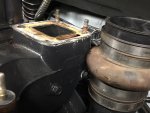northernterritory
Seaman
- Joined
- Sep 4, 2017
- Messages
- 69
I just had all fluids changed and the engine gone through to make sure it was in good shape. Today, I was riding around and I started hearing an air noise from the engine that sounded like and old-school hit & miss engine. The engine also sounds like the valves may be chattering.
Any ideas with whats up?
P.S., the Volvo 3L blocks are the same as Merc, right?
Any ideas with whats up?
P.S., the Volvo 3L blocks are the same as Merc, right?
Last edited:




















